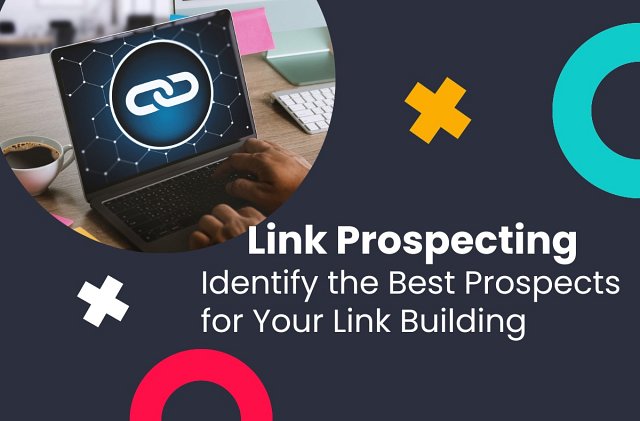(13 min. read)

What is link prospecting?
Link prospecting involves finding and evaluating prospective potential websites to get high-quality links from. It is a crucial step in the process of link building which is aimed at improving a website’s visibility and ranking on search engines. This process is guided by your link building strategy, the type of links you're after, and the SEO tools at your disposal to assess the quality of these prospective linking sites and identify the right contacts for your outreach campaigns. It's not a one-off activity but a continuous process of discovering new opportunities, analyzing the outreach results, and refining the strategies accordingly.
What’s the difference between link prospecting and link building?
Link prospecting and link building are two integral, yet distinct stages in the process of enhancing a website's SEO performance. It’s safe to say that link prospecting is a branch of link building. It is the initial phase where marketers identify, research, and qualify potential websites that could provide valuable backlinks to their site. This involves a detailed analysis to find reputable and relevant sites, assessing their domain authority, and understanding the likelihood of securing a backlink from them. While link prospecting lays the groundwork by identifying potential link opportunities, link building actualizes these opportunities to secure backlinks that can significantly enhance the website's authority and rankings in search engine results.
Importance of link prospecting
Link prospecting is a cornerstone of effective link building, and, by extension, a robust SEO strategy. Through the meticulous identification and qualification of websites, link prospecting ensures that link building efforts are directed towards securing high-quality and relevant backlinks. Apart from identifying potential sources of high-quality links, this research also helps in categorizing and avoiding irrelevant sites that could harm the website’s SEO performance.
By establishing a solid foundation of potential link sources, link prospecting significantly elevates the efficiency and effectiveness of the link acquiring process. It ensures that the time and resources invested in link building are well-spent, paving the way for sustainable SEO success. Moreover, a well-executed link prospecting strategy can unveil opportunities for collaborations, guest postings, and other mutually beneficial arrangements, thereby enriching the overall online presence and reputation of the website.
Link prospecting in SEO strategy
Link prospecting falls under the link building umbrella and plays a vital role in SEO strategy by acting as the foundation for acquiring high-quality backlinks, a key factor in enhancing a website's authority and search engine rankings.
Link prospecting is a crucial component in SEO strategy, offering multiple benefits that extend beyond just acquiring backlinks, such as:
- Identifying High-Quality Link Opportunities: Link prospecting is essential for pinpointing best opportunities, which can significantly boost the search engine rankings of your website, leading to higher visibility and increased organic traffic in search results.
- Establishing Trustworthiness and Authority: Through link prospecting, you can identify authoritative websites in your industry, and by being associated with these sites, your website gains trustworthiness and is seen as a reliable source of information.
- Enhancing Credibility and Engagement: Accurate link prospecting helps in targeting sites that can contribute to increased credibility in your niche. This often results in better user engagement and more traffic to your site.
- Facilitating Valuable Connections: Link prospecting usually involves communication and networking with content creators or website owners, laying the groundwork for future collaborations and relationships.
- Driving Referral Traffic: By prospecting the right sites that align with your content, you can gain referral traffic from audiences of these external websites.
- Networking and Growth Opportunities: Effective link prospecting opens doors to valuable collaborations and networking within your niche, leading to numerous opportunities for growth and development.
How to do link prospecting?
In this section, you’ll find a step-by-step process of how to do link prospecting, which includes the following:
Choose the page you aim to build links for
Before you start your link building efforts, it's essential to clearly define your goals, and more importantly, identify the specific page you want to enhance with new links. Your next step, choosing a particular strategy, will depend on the type of content you're looking to promote and support with these links.
To identify the most beneficial pages for backlinking, begin by assessing which websites could gain the most from additional backlinks. Start this process by delving into the Performance report in Google Search Console. Here, analyze the URL and query pairs. This method is the simplest way to determine which page requires link building and will also help you decide on the most suitable anchor text. To ensure that your choice is well-founded, it's wise to cross-reference the data collected from Google Search Console with other tools like Ahrefs or SEMrush. This comparative analysis will confirm the validity of your decision.
For instance, if you're about to release a report filled with unique data and interesting insights, you might opt for a Digital PR campaign approach. This decision will guide your search for the most suitable prospects. On the other hand, if your aim is to promote an individual blog post, such as the SEO for SaaS Companies Guide, guest posting on marketing blogs could be your chosen method for acquiring backlinks to your page.
In essence, the type of content you wish to amplify will dictate your link building strategy and the way you seek out prospects.
Choose link prospecting method
The approach you take in prospecting future links will largely depend on the link building technique you're aiming to employ. The process of searching for guest post opportunities differs from finding pages suitable for niche edits and link insertions. Therefore, it's essential to first determine the type of links you're seeking to acquire, and then select a prospecting method that aligns with your goals. Keep in mind that each link building strategy calls for a unique set of prospects, making the initial choice of strategy a pivotal step for future success.
Find your prospects
Site relevancy depends on your goals, link building efforts and business. Two types of relevance are available, including geographical and topical. You’ll require links from a website with a higher topical relevance if you want to get links to establish perceived authority with Google and other search engines. On the other hand, you’ll require geographically relevant links from websites such as news outlets and local businesses if you’re looking to boost your SEO and get local customers.
Analyzing your competitors’ backlink profiles is the most straightforward approach to identifying potential link prospects. By reviewing the list of pages that link to your competitors, you can infer these sites are likely to link to your page too, as they have already been assessed for relevance and quality. Categorizing these links based on specific characteristics can provide valuable insights into the types of campaigns that might be effective for you in the future. However, it's crucial to remember that in SEO, your direct business competitors aren't always your main concern. When looking for opportunities to boost a page's visibility for certain keywords, it's important to investigate what currently ranks for those keywords on Google. Take note of the types of pages linking to these search competitors, as this can offer further guidance on where to focus your link acquisition efforts.
If you’re looking for guest posting opportunities, consider utilizing Google search operators to find pages featuring keywords like 'guest post', 'contribute', and similar terms. This method can help you compile a list of potential sites for guest blogging.
Another technique for uncovering link insertion prospects involves setting up alerts in tools like Google Alerts, Brand24, or Ahrefs for specific keywords. This strategy enables you to quickly identify new content that mentions topics covered on your website. Once you have a list of pages that include these keywords, you can initiate outreach campaigns, offering your content as a credible resource for them to link to.
Assess the value of the prospects
After finding sites relevant to your niche, qualification should be your next step. It’s the process of qualifying your list of prospects. These are link building opportunities you have created depending on specific, qualitative criteria. Qualitative criteria means metrics such as the site’s domain authority. Other qualifying criteria include topical relevance which cannot be measured easily like the site’s domain authority.
It is also important to think about your target metrics like organic traffic, traffic value, and domain rating. The higher a site's domain authority, the more helpful and impactful the link will be. However, generating resource links from authoritative websites is also typically difficult. Aim metrics for traffic value £1,000+, organic traffic 1,000+, and DR 40 – 80.
Find relevant contacts
Sometimes, the toughest part of link prospecting is finding the right contact details. Limited availability of these details might reduce the pool of prospects. It's generally advisable not to exert too much effort in searching for hard-to-find contacts. They're likely not publicly available for a reason, and reaching out to them may not yield the desired outcomes.
When prospecting for links, it’s also crucial to identify the most appropriate person to contact. For instance, if your pitch involves link insertion, the original author of the content is often the best contact. In cases of guest posting, the editor or the website's content manager might be the key decision-maker. Understanding the roles and responsibilities within a website can significantly increase the effectiveness of your outreach.
Many sites have web forms on their respective "contact us" pages. They use web forms to avoid being bombarded with tons of spammy emails. SEO researchers in search of contact information may turn to tools like Apollo or Hunter, or perform an advanced search on Google using wildcard operators like '@domain.com'. Some email outreach tools have their own databases and can provide the necessary contact information.
The approach to finding contacts can vary based on the link prospector, the tools employed, and the strategy being used. Seeking contacts for backlink opportunities is a legitimate aspect of SEO research, but it must be conducted ethically and respectfully, with privacy concerns and legal requirements in mind.
How to find link opportunities?
Several ways are available to help marketers find link opportunities, which include:
- Analyze your main competitors: Analyze your competitors to know where they’re getting their links from. If you get everything right, you’ll identify opportunities and gaps in your industry. You’ll also learn from their weaknesses and strengths. Semrush, Moz, and Ahrefs are some of the popular tools you can use to analyze your competitors. These tools will enable you to find their ranking keywords, domain authority, and backlink profile.
- Use link prospecting tools: With the best link prospecting tools, you can find and evaluate prospective link sources based on different criteria like traffic, authority, and relevance. Link prospecting tools like BuzzSumo help you automate the entire process, saving you time and effort.
- Craft and pitch valuable content: Craft and pitch content that is relevant, engaging, and valuable. This content can be ebooks, podcasts, infographics, or blog posts. You need to create a compelling and personalized email that explains why your content is valuable and worth linking to when pitching.
- Monitor and measure your results: It’s important to closely monitor and measure your results since you’ll know if your efforts and resources are affecting your site’s ranking and performance positively. You need to track and measure things like the backlinks you earn (quality and number), traffic coming from these sites and keywords.To track and analyze these metrics use tools like Ahrefs, Google Analytics, and Google Search Console are ideal.
Link prospecting tools
When you search for good sites to link to using Google, the keywords you use may limit your searches. To minimize this dependency, Google features advanced search operators that can help filter results based on your unique needs. Inurl, Site, and Intitle are the most common Google search operators.
- Inurl: It offers a list of sites that have the keyword you have specified in their URL. For instance, a search query; “inurl:link-prospecting” will bring a page with the phrase “link prospecting” in its URL, irrespective of its type (a blog post, a homepage, or an indexed category).
- Intitle: It provides a list of pages that feature the keyword in their titles. For example (intitle:resources “Jacksonville”) will provide results with Jacksonville in their titles.
- Site: It enables you to find trusted sites with the keyword you’ve used. Most of the results include sites that have ".org", ".edu" and ".gov". Let’s look at an example; you may use (site:.edu “keyword”) for broken link building, (site:.edu “scholarship”) for scholarship link building, and (site:.org “partners”) for professional organizations).
WhitePress
WhitePress is an excellent tool for finding link building opportunities. It enables you to publish high-quality, original articles on thousands of websites, yielding fast results. Additionally, the platform features websites offering link insertions in existing articles. For link prospecting, WhitePress allows you to efficiently filter pages based on your specific criteria, saving time compared to traditional methods.
Ahrefs
Ahrefs is a detailed Search Engine Optimization tool with a comprehensive database. It offers multiple possibilities to use when searching for link building opportunities. It helps to identify linking prospects, analyse competitors’ backlink profile, backlinks and anchors linking to your website.
Ahrefs offers a variety of website metrics, including Domain Rating (DR), the number of linking pages, the number of outgoing links, and more. These metrics can be invaluable for assessing the value and relevance of a potential prospect.
Link prospecting tips
You've got a better understanding of link prospecting. It’s now the perfect time to look at some important link prospecting tips that professional link builders use, which include:
- Find prospects with market relevancy: The more relevant a site is to yours, the better. It doesn’t matter how authoritative the site might be; your site's ranking on a search engine won’t increase if the relevancy score of the authoritative websites is low.
- Check for organic growth: Avoid any websites that use unnatural link building techniques for their rankings. These websites can receive a penalty at any time, and that is the last thing you want to think of.
- Do outreach like a human:Try to be more personal and treat prospects like humans. Today, you can’t send a template and spam every prospect on your list. Establishing relationships is necessary to get links faster.
- Offer value: Make sure that you’ve something valuable to provide in return for a backlink. Offering value is a perfect way to build strong relationships with other bloggers or marketers.
- Follow up, but do not spam: Follow up with your prospects when you don’t receive a response. Remind them that you send an email, as some of them are too busy and forget to offer a response.
After prospecting: reaching out to potential link partners
The main goal of prospecting is to find websites for outreach to secure links. Contact details are a crucial part of this process. Let's explore the steps required to reach out to potential link partners.
- Prospect the right contact: Conduct research to determine which sites, companies, or bloggers are most suitable for your campaign.
- Use catchy email subject lines: Ensure your email subject line gets right to the point. The subject should be direct, specific, easy to understand, and relate to your pitch.
- Add personalization: Tailor the body of your email to the recipient. Personalization shows that you are familiar with their audience and work. It can be something like “hope everything is going great in Houston.”
- Demonstrate value: Clearly articulate in your email how partnering with you is mutually beneficial. Show how posting content on their sites or linking to your website adds value on both sides.
- Don’t forget CTA: A good call to action will have three key parts: a request, what you intend to do, and a link to the article you want them to review. You should have two CTAs: within the pitch and in the end.
- Follow-up: Allow between three and four days before you can initiate a follow-up email. If there's no response, consider reaching out again after a few months.
- Track your campaign: Monitor your campaign to measure the response rates and see which businesses are engaging you and those that are outwardly saying “NO.”
By following these steps, you can enhance your chances of successfully building links through targeted outreach.



